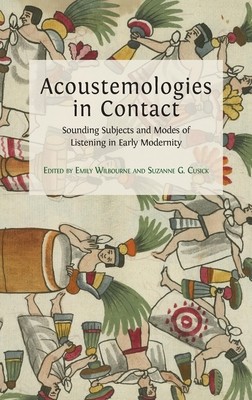
- We will send in 10–14 business days.
- Publisher: Open Book Publishers
- ISBN-10: 1800640366
- ISBN-13: 9781800640368
- Format: 15.6 x 23.4 x 2.7 cm, hardcover
- Language: English
- SAVE -10% with code: EXTRA
Acoustemologies in Contact (e-book) (used book) | bookbook.eu
Reviews
Description
In this fascinating collection of essays, an international group of scholars explores the sonic consequences of transcultural contact in the early modern period. They examine how cultural configurations of sound impacted communication, comprehension, and the categorisation of people. Addressing questions of identity, difference, sound, and subjectivity in global early modernity, these authors share the conviction that the body itself is the most intimate of contact zones, and that the culturally contingent systems by which sounds made sense could be foreign to early modern listeners and to present day scholars.
Drawing on a global range of archival evidence-from New France and New Spain, to the slave ships of the Middle Passage, to China, Europe, and the Mediterranean court environment-this collection challenges the privileged position of European acoustical practices within the discipline of global-historical musicology. The discussion of Black and non-European experiences demonstrates how the production of 'the canon' in the cosmopolitan centres of colonial empires was underpinned by processes of human exploitation and extraction of resources. As such, this text is a timely response to calls within the discipline to decolonise music history and to contextualise the canonical works of the European past.
This volume is accessible to a wide and interdisciplinary audience, not only within musicology, but also to those interested in early modern global history, sound studies, race, and slavery.
EXTRA 10 % discount with code: EXTRA
The promotion ends in 20d.02:31:59
The discount code is valid when purchasing from 10 €. Discounts do not stack.
- Publisher: Open Book Publishers
- ISBN-10: 1800640366
- ISBN-13: 9781800640368
- Format: 15.6 x 23.4 x 2.7 cm, hardcover
- Language: English English
In this fascinating collection of essays, an international group of scholars explores the sonic consequences of transcultural contact in the early modern period. They examine how cultural configurations of sound impacted communication, comprehension, and the categorisation of people. Addressing questions of identity, difference, sound, and subjectivity in global early modernity, these authors share the conviction that the body itself is the most intimate of contact zones, and that the culturally contingent systems by which sounds made sense could be foreign to early modern listeners and to present day scholars.
Drawing on a global range of archival evidence-from New France and New Spain, to the slave ships of the Middle Passage, to China, Europe, and the Mediterranean court environment-this collection challenges the privileged position of European acoustical practices within the discipline of global-historical musicology. The discussion of Black and non-European experiences demonstrates how the production of 'the canon' in the cosmopolitan centres of colonial empires was underpinned by processes of human exploitation and extraction of resources. As such, this text is a timely response to calls within the discipline to decolonise music history and to contextualise the canonical works of the European past.
This volume is accessible to a wide and interdisciplinary audience, not only within musicology, but also to those interested in early modern global history, sound studies, race, and slavery.


Reviews